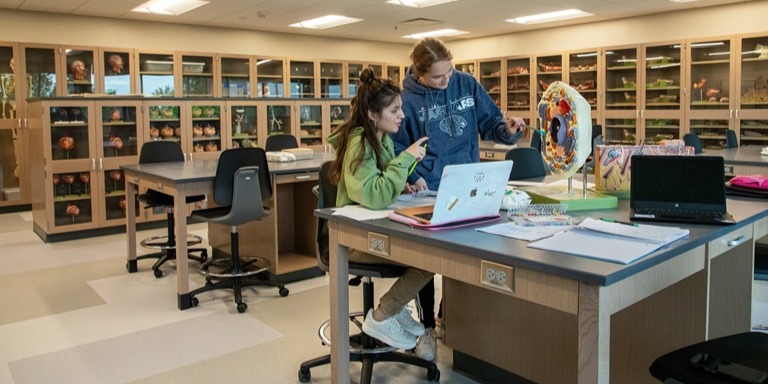Johnson County Community College: Focusing on Community College Undergraduate Research

Undergraduate research, while often not emphasized at community colleges, has found a champion in Johnson County Community College (JCCC). A team of JCCC students was recently named one of five winners of the U.S. Department of Energy (DOE) AlgaePrize challenge. The team also received the award for best video and a $10,000 prize for their research.
The Chlorella Cavaliers, a volunteer group comprised of JCCC credit students led by Professor of Biology Dr. Heather Seitz, began research in fall 2023. Seitz recruited students from her courses to research and develop a novel strain of Chlorella algae for the AlgaePrize competition.
AlgaePrize called for proposals from high school, community college, college, university, and graduate students from across the United States to research and develop technologies in the commercial algae sector. The 2023-2025 competition was sponsored by the DOE Bioenergy Technologies Office and supported by the Algae Foundation and the National Renewable Energy Laboratory.
About the Research
In 2024, out of hundreds of proposals, the Chlorella Cavaliers were selected as one of 15 semifinalists. The students received an $8,000 award for research and $2,000 to cover travel expenses to Golden, Colorado, for the competition weekend.
Throughout the 2024-2025 academic year, Seitz and the students worked to degrade polyethylene terephthalate (type 1 plastic) in bacteria to Chlorella vulgaris algae, which had never been done before. The students successfully introduced DNA into the algae and verified that it broke down plastic better than normal/wildtype Chlorella vulgaris.
The team presented its research at a three-day conference at the National Renewable Energy Lab in Golden from July 18 to 20, 2025. They competed against teams from two- and four-year colleges from across the country. A panel of expert judges selected JCCC’s team as one of five champions from the first round of presentations.
Chlorella Cavaliers was the only community college team chosen as a champion; the four other champion teams were all from universities and included graduate students. After initial selection, the five champion teams competed in a second round of presentations for the grand champion prize, which was awarded to the Parachlorella Plastic Pals, a team of graduate students from University of California San Diego.
Seitz proudly asserted that the JCCC team demonstrated what students can accomplish in the first two years of college. “They [conducted] amazing research, created a professional video, and were able to successfully answer questions from the judges. I couldn't be more proud of the work they put in over the course of two years,” she said.
Creating Opportunity for Community College Undergraduate Research
Research has traditionally been reserved for graduate students, but faculty at JCCC have witnessed the transformational power that opportunities for undergraduate research have for community college students. In 2015, JCCC approved updates to the facilities master plan that modernized the science education and learning laboratories on campus. The classroom and lab renovations were completed in 2023, right around the time Seitz and her students started researching Chlorella.
“The updates to the STEM facilities have opened so many possibilities for innovative instruction,” said Dr. Mary Wisgirda, Dean, Mathematics and Sciences. “The new and updated classroom and lab facilities enable faculty to better prepare students for advanced research opportunities at four-year institutions and give students experience with equipment they may encounter in the workplace.”
These spaces have engaged students beyond their coursework. The Chlorella Cavaliers were able to conduct cutting-edge scientific research because of the state-of-the-art lab equipment and updated classrooms.
Increased Student Participation in STEM Research
The AlgaePrize competition is just one of many ways JCCC students gain hands-on experience conducting scientific research. Each semester, JCCC faculty organize conference-style poster sessions for students to present research on a variety of STEM topics. Students can participate in the Course-based Undergraduate Research Experience (CURE) Symposium in the fall and the STEM Poster Symposium in the spring to showcase their research and projects.
Brenda Edmonds, JCCC Professor of Mathematics and co-organizer of the STEM Poster Symposium, said, “Sometimes students discover they want to pursue a career in science or math as a result of these projects—it’s a unique opportunity to engage with STEM topics they are passionate about.”
In addition to generating interest in STEM-related fields, these annual opportunities help JCCC students build confidence in communicating scientific information and learn how to collaborate with faculty on research; students also receive feedback from experts in the STEM field. In spring 2025, more than 500 students presented 330 research projects in the college’s largest-ever STEM Poster Symposium.
Vision for the Future
JCCC’s science facility innovations have increased students’ overall interest in STEM fields significantly. Since 2020, the college has seen a 41 percent increase in graduates from STEM-related academic programs.

JCCC is continually seeking creative new ways to meet the needs of our students and community. According to Dr. Tony Miksa, President of JCCC,
Innovation in science, technology, engineering, and math equips our students with the critical thinking skills to solve real-world problems and drive progress in our communities. When we invest in STEM, we’re investing in solutions to real-world challenges, in economic growth, and in a more equitable and sustainable tomorrow.
In academic year 2025-2026, campus leaders will work to develop the college’s next facilities master plan, a 10-year project to ensure that college facilities align with evolving student needs and academic interests, and support their success. JCCC’s Board of Trustees approved the development of a new plan in June 2025; additional details about new buildings, classrooms, and facility improvements will be available in the coming year.
Lead image: Students immersed in hands-on research and collaborative learning in one of JCCC’s state-of-the-art science laboratories
Emma Swinney is Coordinator, Public and Media Relations, at Johnson County Community College in Overland Park, Kansas.
Opinions expressed in Member Spotlight are those of the author(s) and do not necessarily reflect those of the League for Innovation in the Community College.










